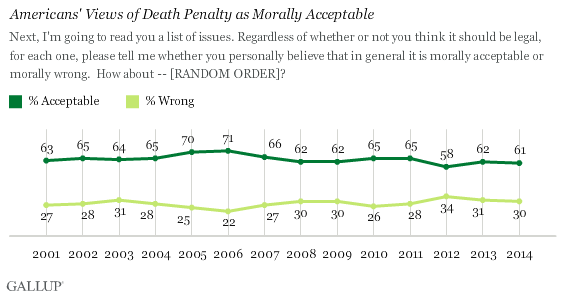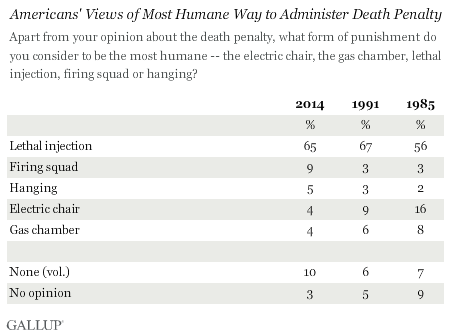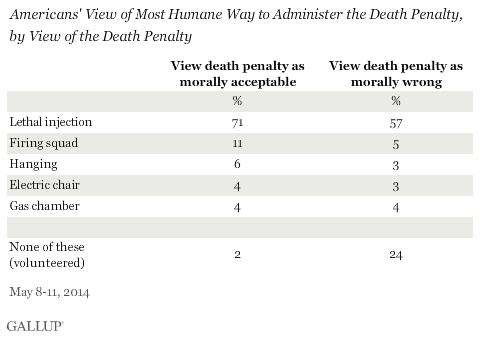PRINCETON, NJ -- The recent news about the botched execution of an Oklahoma death row inmate has not affected the way Americans view the death penalty. Sixty-one percent say the death penalty is morally acceptable, similar to the 62% who said so in 2013, although both figures are down from a high of 71% in 2006.

The results are based on Gallup's annual Values and Beliefs poll, conducted May 8-11. On April 29, an Oklahoma death row inmate given a lethal injection appeared to suffer for an extended period of time until finally dying of a heart attack. That incident led to the postponement of a second execution scheduled in Oklahoma that day and raised questions about the methods used to execute prisoners.
The case did not fundamentally alter Americans' perceptions of the death penalty, however, with a solid majority viewing it as morally acceptable. This percentage is similar to the 60% who say they favor the death penalty as punishment for murder in Gallup's October update.
But the longer-term trends reveal that Americans have become less supportive of the death penalty. Gallup first asked the moral acceptability question in 2001, with an average 66% saying it was acceptable between 2001 and the peak in 2006. Over the last three years, the percentage saying it is morally acceptable has averaged 60%.
Similarly, Americans' support for the death penalty as a punishment for murder is also trending downward. Support reached a high of 80% in 1994, but it has generally slipped since then.
Americans Still Say Lethal Injection Most Humane Form of Execution
Lethal injection has been the most common method state officials have used to execute death row inmates for many years. The American public generally approves of that approach, as the poll finds Americans overwhelmingly saying lethal injection is the most humane way to administer the death penalty. The 65% holding this view compares with between 4% and 9% who endorse another method -- the electric chair, gas chamber, firing squad, or hanging -- as the most humane way to execute someone sentenced to death.
Gallup has asked this question twice before, and although 23 years have elapsed since the question was last asked, the results today have changed little. In 1991, 67% said lethal injection was the most humane method for administering the death penalty, and in 1985, 56% said this.

A majority of those who view the death penalty as morally acceptable and those who view it as morally wrong say lethal injection is the most humane way to execute prisoners. However, this belief is more common among those who say the death penalty is acceptable. Notably, roughly one in four of those who say the death penalty is morally wrong volunteer that "no method" is the most humane way to execute someone.

Implications
The drawn-out death of the Oklahoma prisoner reignited the debate over whether the death penalty violates the Constitution's prohibition of "cruel and unusual" punishment. The U.S. Supreme Court invalidated state death penalty statutes in the 1972 case Furman v. Georgia, deciding that death sentences were often arbitrary and consequently were a form of cruel and unusual punishment. Later, in the 1976 Gregg v. Georgia judgment, the Supreme Court ruled that states' rewritten statutes did pass constitutional muster, leading to a resumption of the death penalty in the U.S.
Americans have long supported the death penalty, with majorities saying they favor it as a penalty for murder and believe it is morally acceptable. While both of these Gallup trends show diminished support for the death penalty in recent years, the trends were in place well before the Oklahoma case.
Survey Methods
Results for this Gallup poll are based on telephone interviews conducted May 8-11, 2014, with a random sample of 1,028 adults, aged 18 and older, living in all 50 U.S. states and the District of Columbia.
For results based on the total sample of national adults, the margin of sampling error is ±4 percentage points at the 95% confidence level.
Interviews are conducted with respondents on landline telephones and cellular phones, with interviews conducted in Spanish for respondents who are primarily Spanish-speaking. Each sample of national adults includes a minimum quota of 50% cellphone respondents and 50% landline respondents, with additional minimum quotas by time zone within region. Landline and cellular telephone numbers are selected using random-digit-dial methods. Landline respondents are chosen at random within each household on the basis of which member had the most recent birthday.
Samples are weighted to correct for unequal selection probability, nonresponse, and double coverage of landline and cell users in the two sampling frames. They are also weighted to match the national demographics of gender, age, race, Hispanic ethnicity, education, region, population density, and phone status (cellphone only/landline only/both, and cellphone mostly). Demographic weighting targets are based on the most recent Current Population Survey figures for the aged 18 and older U.S. population. Phone status targets are based on the most recent National Health Interview Survey. Population density targets are based on the most recent U.S. census. All reported margins of sampling error include the computed design effects for weighting.
In addition to sampling error, question wording and practical difficulties in conducting surveys can introduce error or bias into the findings of public opinion polls.
View survey methodology, complete question responses, and trends.
For more details on Gallup's polling methodology, visit www.gallup.com.